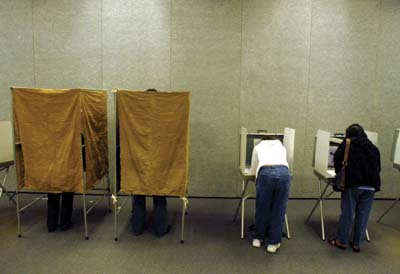
California voters on May 19 will consider six ballot initiatives to round out legislators’ efforts to balance the $42 billion deficit. Below is a brief synopsis of each proposition, as summarized by the League of Women’s Voters, along with major reasons why we are for or against them:
Proposition 1A: No
It would increase the size of the state’s primary rainy-day fund allocation from 5 percent to 12.5 percent of the general fund, a portion being dedicated toward future economic downturns, with the remaining balance available for other uses such as education and infrastructure upgrades. It also would extend a series of state tax increases from 2010-11, as recently approved, through 2012-13. We support the increase to the rainy-day fund, but not the extension to state tax increases. It ultimately would result in permanent hikes that are difficult to rescind once they are lodged into the state’s messy tax structure.
Proposition 1B: No
It would require supplemental payments to local school districts and community colleges to make up for recent budget cuts, with annual payments starting in 2011-012. Supporters contend how the budget crisis has cut $12 billion from schools and more than 5,000 teachers have been laid off, with more jobs threatened. Declining resources are an inevitable impact of a large state budget deficit, a consequence of wasteful spending practices by legislators. Using a formulaic, discriminating approach, however, is a reason for concern, because other programs get the short end of the stick, and also sets the stage for another potentially institutionalized tax hike.
Proposition 1C: No
This one targets the state lottery system and redirects $5 billion in future lottery profits toward general fund spending. Along with this, the state would establish a program to improve marketing of the lottery system and, ultimately, revenue gained from it. A “no” vote, however, would result in California following its current practice of allocating existing lottery revenues toward education. This is merely a shifting of funds that creates future debt taxpayers must eventually pay off, while pursuing efforts to boost gambling activity in California.
Proposition 1D: No
It would redirect more than $600 million in funds earmarked for children’s health programs into the general fund to offset shortfalls in the budget for current health and human services programs for young children. That amount would be redirected in the first year, with an amount slightly less than half of that in each of the next four fiscal years. Again, this is chipping away at future resources to pay for irresponsibility of existing legislation.
Proposition 1E: No
It would redirect $225 million in funds, and designate them as “flexible,” set aside for mental health program expansion to pay for current shortfalls for young adults and children. As for our take on this redirection of tax dollars from one needed fund to another, see Props 1B through 1D.
Proposition 1F: Yes
This would prevent legislators and other consitutional officers from receiving pay raises in years when the state runs deficits. The direct savings is minimal in the larger picture, but the greatest benefit from this proposal comes from the incentive legislators will have to forego wasteful spending. It is a more-than-fair, performance-based goal – especially considering taxpayers are on the hook in the end for the incompetence of their wasteful representatives.







